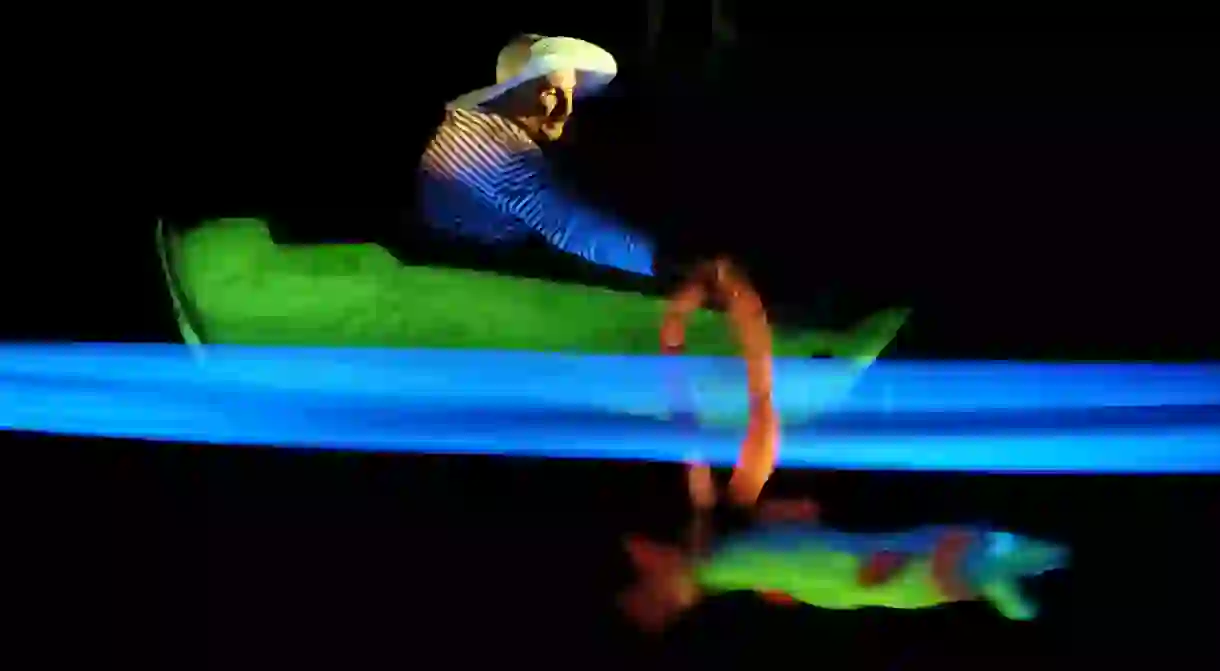The Magical World of Prague’s Black-Light Theatres

Through whimsical storytelling and state-of-the-art special effects, this colourful performance style has become a popular tourist attraction in the Czech capital.
Black-light theatre combines a dark backdrop, UV lighting and bright costumes and props to create a unique storytelling experience. While the techniques behind it originated in Asia, black-light theatre has become a Czech speciality and is performed by several theatre companies throughout Prague. These performances have become a favorite of tourists from around the world as the stories are told without words, eliminating the need for translation.
Secrets of black-light theatre
There are two main identifying features of black-light theatre. The first is the use of the ‘black box’ or ‘black cabinet’ trick, which camouflages black objects on a black background. For this to work correctly, the entire theatre must be engulfed in pitch darkness. The second feature, and the reason that the illusion works, is the method of illuminating the fluorescent costumes and stage props with UV lights. This design plays a visual trick on the viewers, hiding certain people and objects on stage while highlighting and drawing the eye to others.

Performing an entire show in the dark can be a challenge though, as the performers are almost blind on the black set. Theodor Hoidekr, director and art director of HILT, Prague’s youngest black-light theatre, shares that the secret to perfecting this is to always know where the middle of the stage is. “The best situation is when people in the audience wear some white clothes so we can see them,” he says, as this helps orient the performers.
Light effects, projections, puppets, acrobatics and dance are all commonly combined in black-light theatre to create mesmerizing optical illusions that captivate the imagination of the audience. “No lasers, no computer animation – and yet we reach a world of virtual reality, a world in which viewers witness amazing things before their very eyes,” says Julius Hirsch, director of Prague’s Ta Fantastika theatre.

While some performances may include singing or various sound effects, black-light theatre shows do not have any spoken dialogue, with the performers telling the story primarily through movement. Due to this, black-light shows are able to transcend language barriers and entertain people from across the globe. Hoidekr explains that for HILT, “the most important idea is to connect all nations and generations in one audience.”
When did black-light theatre come to Prague?
Through its artistic storytelling style, black-light theatre embraces and honours the surrealist aesthetic that has long existed in Prague. While shadow plays and the use of the signature ‘black cabinet’ trick can be traced back to performances that took place in China during the Ming dynasty, it is director Jiří Srnec who is widely considered to be the father of the modern Czech black-light theatre style.
Srnec pieced together all the key elements that make up black-light theatre today for the inaugural performance in 1959 and cemented the style’s place on the theatre scene in 1962 at Edinburgh’s Theatre Festival. As a result of the high acclaim this performance received, he took the show on the road, performing on almost every continent. Following the 1989 Velvet Revolution, Srnec returned to Prague to open the first exclusively black-light theatre in the world, Black Light Theatre Srnec.

While black-light theatre shows can be enjoyed around the world nowadays, Prague has remained the centre for the art form, and catching a show is one of the most popular things to do in Prague. This is in part thanks to the resurgence of interest in this type of performance following the removal of bureaucratic obstacles restricting artistic freedom after the fall of Communism in the country. During the early 1990s, many Czech artists took an interest in black-light theatre, revolutionising the art with new lighting techniques and giving this particular performance style a place to call home. Today, there are around 10 black-light theatre companies in Prague.
Fans of classic novels can take in a new twist on their favorites at Ta Fantastika. Its interpretations of stories such as The Little Prince and Alice in Wonderland are unlike any other retelling. The HILT Black Light Theatre is the only independent black-light theatre company in the city and the only one to use projections on the ceiling, adding another element to its unique performances. For those interested in learning more about the tricks of the trade, Divadlo Metro hosts an interactive workshop after each performance. It is the only black-light theatre in Prague to reveal its secrets, inviting audience volunteers on stage to try for themselves.

Hundreds of thousands of visitors to this historic city over the years have enjoyed the tradition and the magic of Prague’s black-light theatre. The question of why the performances remain so popular, in an age of high-tech entertainment, has a simple answer in Hirsch’s mind. “Once you take part in this great mystery, whether it be from the audience or on the stage, you will never want to give it up.”













